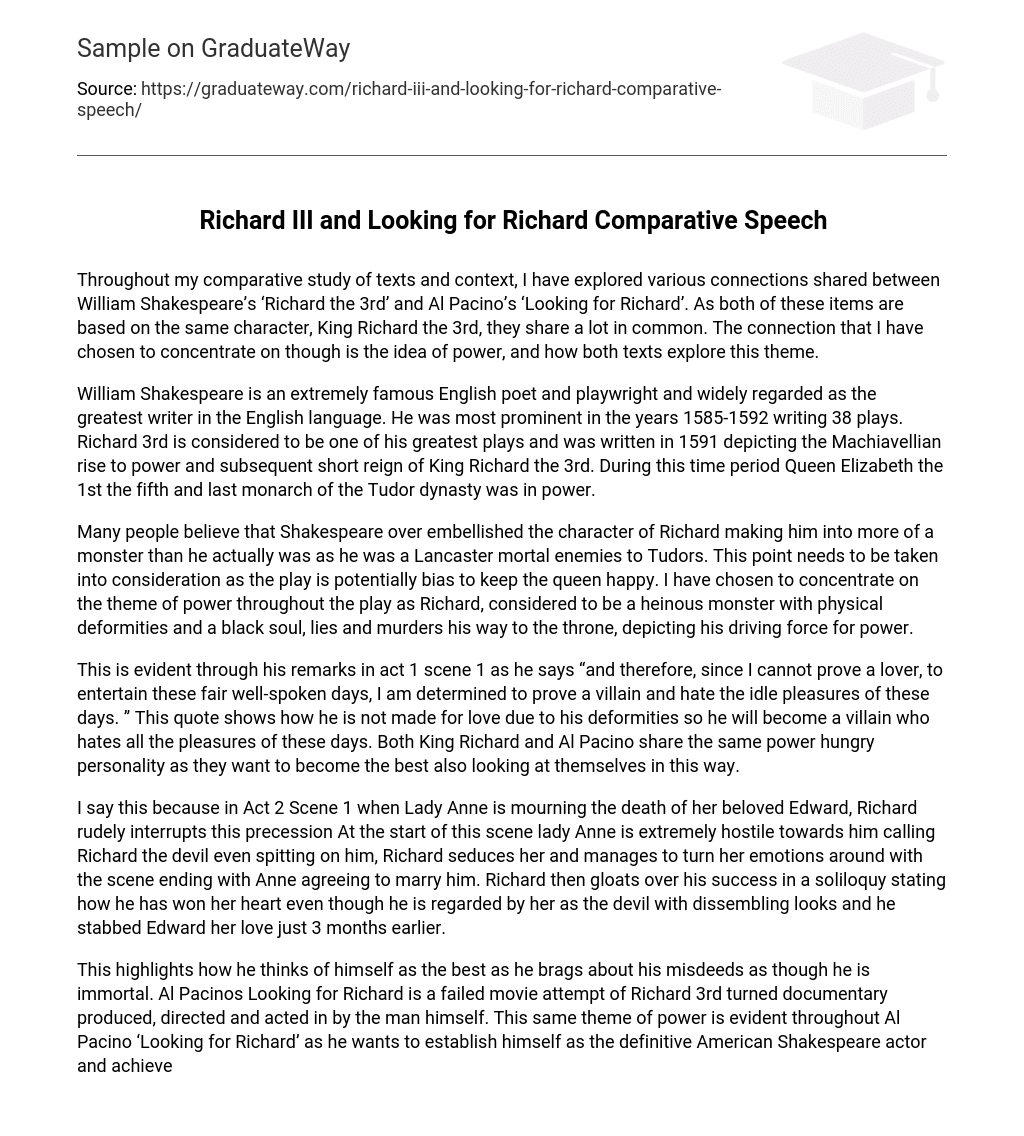During my comparative study of texts and context, I have examined the numerous connections between William Shakespeare’s ‘Richard the 3rd’ and Al Pacino’s ‘Looking for Richard’. Since both works revolve around the character King Richard the 3rd, they understandably have many similarities. However, the aspect I have chosen to focus on is the concept of power and how it is explored in both texts.
William Shakespeare, an extremely famous English poet and playwright, widely regarded as the greatest writer in the English language, was most prominent in the years 1585-1592. He wrote 38 plays, among which Richard 3rd is considered one of his greatest. Written in 1591, this play portrays the Machiavellian rise to power and short reign of King Richard the 3rd. This was also the time when Queen Elizabeth the 1st, the fifth and last monarch of the Tudor dynasty, was in power.
There is a belief among many that Shakespeare exaggerated Richard’s character to portray him as more monstrous than he truly was, due to his enmity with the Tudors as a Lancaster. It is important to consider this viewpoint, as it suggests a potential bias in the play to please the queen. I have chosen to focus on the theme of power in the play, as Richard, perceived as a horrifying monster with physical deformities and a wicked soul, deceitfully and violently ascends to the throne, showcasing his insatiable hunger for power.
In act 1 scene 1, the text indicates that Richard declares, “and therefore, since I cannot prove a lover, to entertain these fair well-spoken days, I am determined to prove a villain and hate the idle pleasures of these days.” This statement illustrates his unsuitability for love due to his physical abnormalities, leading him to adopt a villainous role and disdain the enjoyments of contemporary times. It is apparent that both King Richard and Al Pacino share a common ambition for power, as well as a personal inclination towards perceiving themselves in a similar manner.
I say this because in Act 2 Scene 1, Richard interrupts Lady Anne’s mourning for Edward, whom she deeply loved. Despite Anne’s initial hostility towards Richard, calling him the devil and even spitting on him, he seduces her and changes her emotions. The scene ends with Anne agreeing to marry Richard. Richard then boasts about his success in a soliloquy, exclaiming how he won her heart despite being seen as the devil with deceitful looks. He had previously killed Edward, whom she loved, only three months ago.
The text emphasizes the speaker’s perception of himself as superior, as he boasts about his wrongdoings as if he cannot be harmed. Al Pacino’s film “Looking for Richard” is an unsuccessful adaptation of Richard 3rd that takes the form of a documentary. Pacino serves as the producer, director, and lead actor in this project. The desire for power is a recurring theme in “Looking for Richard” as Pacino aims to establish his status as the ultimate American Shakespearean actor and reach greatness. This goal is driven by the fact that American actors have historically avoided performing Shakespeare, as it has traditionally been associated with English performers. However, Pacino strives to challenge this notion.
The documentary ‘looking for Richard’ directed by and starring Al Pacino presents him as surpassing anyone else. Fredrick Kimball, also the movie’s director, emphasizes this by passionately stating, ‘You know more about Richard the 3rd than any other fucking scholar at Columbia or Harvard.’ With this statement, Kimball positions Pacino instantly above all the scholars studying Shakespeare at prestigious institutions such as Columbia and Harvard.
This strategy underscores Pacino’s unparalleled talent as an American Shakespeare actor and invites comparison with the legendary performers. Additionally, the film uses a similar approach throughout by editing interviews with knowledgeable scholars to portray them as ignorant and uninformed.
The use of this technique makes Pacino appear more intelligent than individuals who have dedicated their entire lives to studying Shakespeare. Additionally, it demonstrates to the primarily American audience that Americans are capable of performing Shakespeare. Both Richard the 3rd and Al Pacino employ commanding tones as Richard is pivotal to the play and Pacino is essential to the documentary, thereby effectively exerting their influence.
Both Richard and Pacino harness their power to achieve their goals – Richard seeks to become king and fulfill his desires, while Pacino aims to establish himself as the ultimate American Shakespeare actor. As I delve into these texts, I discern a parallel between Richard III and Al Pacino in their relentless pursuit of greatness and control.





